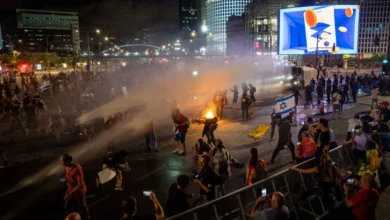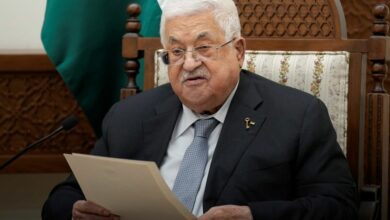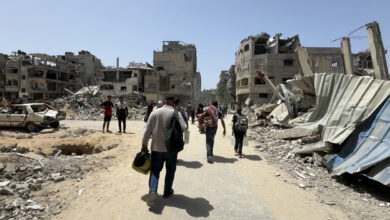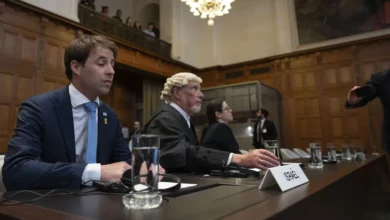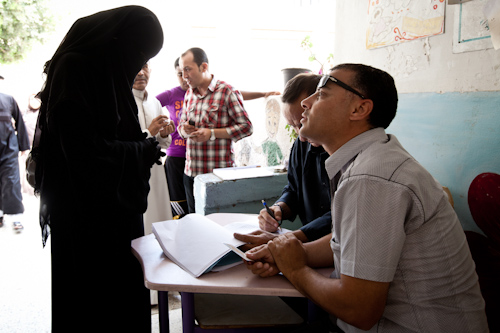
While being often remembered in the news as the home of lawlessness, Sinai also had its two days of voting hype this week.
While the turnout is moderate to low and the choices are not deemed too revolutionary by the revolution’s standards, many rejoiced over the experience of exercising a civil right, in a landscape where many of these are missing.
“Today is a feast for everyone in Sinai. It’s my first time to vote and it’s everyone’s first time. Everyone is exercising their right to vote. I feel we live in a state, and we’re part of it and this is something I haven’t felt in a long time,” says Mohamed Fouad Abou Shitta, 45, who had just cast his ballot at the Yasser Primary School in the city of Arish.
The people of Sinai have constantly voiced their frustrations over the economic and political marginalization of the peninsula ever since the Camp David Accords were signed with Israel in 1979.
Yet, the feast Shitta refers to doesn’t translate into a massive turnout of the some 200,000 voters of North Sinai. In the border town of Rafah, some polling stations were completely empty. In one of them, the guarding soldiers were dancing to the tunes of a shaaby song that played out of the stereo of a parked car.
“People aren’t used to democracy and aren’t convinced that their vote matters,” says Abdel Moneim al-Refai, spokesperson for North Sinai’s tribes at the Sheikh Zuwayed Preparatory Girl School. “Also tribalism and the prevalence of the patriarch’s choice discourage many tribe members who are in disagreement from voting.”
But Shitta purports that the tribalism of Sinai doesn’t stand in contradiction with the elections as individual choices. He adds that his four-member family are all in disagreement over who to vote for, and all went ahead and cast their ballots, including his 90-year-old father.
Many voters interviewed by Egypt Independent expressed their choice of Amr Moussa, former foreign minister under Hosni Mubarak’s toppled regime. They attributed their choices to the political needs of the peninsula, while also undermining Moussa’s adversaries.
Chief among their arguments is Moussa’s position on Israel, which is of most relevance to the border peninsula. However, this position is viewed differently by different voters.
“Politically, Moussa is best for this position. He is not a hardliner on Israel and this is important for the security of Sinai. We will pay the price here in Sinai if any candidate decides to antagonize Israel,” says Mostafa al-Atrash, 35, who had just voted at the Ash al-Asmar school in Arish.
Also voting for Moussa is Awad Suleiman, a sheikh from the Remeilat Tribe, albeit for the opposite reason.
“Moussa won’t bend to Israel. He is not a compromising man and he has a historic position from when he was foreign minister.”
For others, Moussa is just the antithesis of Islamist candidates and particularly the Muslim Brotherhood’s Mohamed Morsy.
“I will vote for Moussa just because everyone else has been promising to do stuff and hasn’t been doing anything. Sinai needs economic solutions and investments and he’s the one who can bring them here. We don’t need anything else,” says Shitta.
For Refai, the surge in radical Islamist groups in Sinai is alienating people from Islamist candidates. Recently, more militant groups are pronouncing themselves in Sinai, after having been crushed for years by Mubarak’s war on Islamists.
But Ayman Awad, a campaigner for Morsy, who had his posters glued all over his car next to a polling station in Arish, said that the disappointment at the Islamists and Brothers in particular is premature.
“Only a moderate Islamist like Morsy, who does not belong to the old regime, can solve Sinai’s problems and meet its needs. It’s true people are complaining that the Brothers haven’t done much in Parliament so far, but that’s because the military council is not giving them any authority,” he says.
Outside the city, the binary between feloul (remnants of the old regime) and Islamists is disrupted by a group of young campaigners dubbing themselves the revolutionary clique.
Abdel Rahman Gomaa, a representative for former Brotherhood member Abdel Moneim Abouel Fotouh, is passionately against the Moussa hype in his town. “It is impossible that Sheikh Zuwayed, one of the places where the revolution started, elects a feloul.”
Soliman Ali, a voter and supporter of Nasserist candidate Hamdeen Sabbahi, says that all supporters of Sabbahi and Abouel Fotouh cluster together next to the polling stations while former Prime Minister Ahmad Shafiq and Moussa’s are together.
Both Ali and Gomaa claim that the army officers in charge of securing the polling stations are subtly endorsing Moussa.
One army general came and distributed flyers that read, “The army and the people want to elect the president” next to the polling station. The back of the flyer reads, “Together for security and stability of the nation, political reform, social reform, democratic reform, better future. And always remember, the army and the people are one hand.”
“What is this supposed to mean?” asks Ali, angrily. He tears the flyer apart and says, “I swear if Moussa or Shafiq wins, we will go back to Tahrir and we will make a Tahrir out of each city in Sinai.”

